News & Media
Unisa hosts commemoration lecture on the Cuito Cuanavale Battle
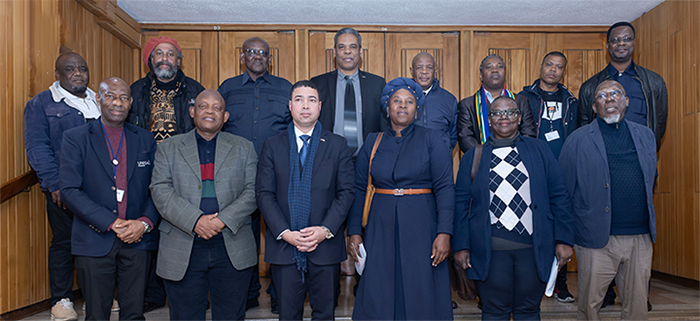
Attendees of the Cuito Cuanavale Battle commemoration lecture
On behalf of the South African Government, in partnership with the Government of Cuba, Unisa hosted a commemoration lecture of the Cuito Cuanavale Battle on 8 July 2025, honouring the pivotal moment in Southern African history that contributed to the end of the apartheid regime. Themed Unwavering and United Pact in remembrance of the discipline and Solidarity displayed during the Cuito Cuanavale Battle, the commemorative event served as a powerful reminder of the sacrifices made and the enduring legacy of those that fought for liberation against the oppressive apartheid regime.
Watch a recording of the event
In his opening remarks, Advocate Sipho Mantula, Researcher at the Thabo Mbeki African School of Public and International Affairs, said that apart from South Africa and Cuba, this battle comprised other countries, including Angola, Namibia, Russia and the United States. He explained: "This battle that was fought 37 years ago for several months in the 1980s, marked a turning point in the Angola Civil War and the broader fight against the apartheid regime in South Africa." He added: "It is considered amongst the biggest wars in Africa since Namibia’s Independence War."
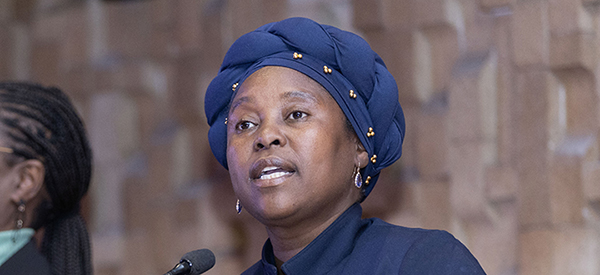
Dr Jane Mufamadi, CEO: Freedom Park Heritage Museum
An enduring symbol of sacrifice, unity and freedom
Speaking next, Dr Jane Mufamadi, Chief Executive Officer of the Freedom Park Heritage Museum, described the battle as an enduring symbol of sacrifice, unity and the unyielding struggle for freedom that ended the apartheid system.
Mufamadi said that this battle is regarded as an event that saw the freedom of the Southern African region. "Therefore," she added, "we are honouring a turning point in the history of our continent." According to Mufamadi, the lecture served as a solemn tribute to the bravery, unity and sacrifice of those that stood against oppression, injustice and foreign domination for the liberation of this region. She further remarked: "It is an opportunity to reflect on the power of solidarity in the face of tyranny, and the observation of the courage and unbreakable spirits of those that laid their lives for liberation to shape the future of Southern Africa."
Continuing, Mufamadi stressed that this war was more than just a military engagement, but it also brought an end to the then South African National Defence Force’s military dominance. She further explained that it shifted the regional balance of power, arguing that this defeat compelled the apartheid government to enter into negotiations that resulted in the 1988 Tripartite Accord between Angola, Cuba and South Africa. She said: "The agreement led directly to the withdrawal of South African forces from Angola and paved the way for the implementation of the United Nations’ Security Council Resolution 435, resulting in Namibia’s independence in 1990."
Furthermore, Mufamadi stated that the Cuito Cuanavale Battle adversely affected the apartheid system by exposing its vulnerability and undermining its legitimacy, both nationally and internationally. Concluding, Mufamadi expressed: "This lecture sought to educate the current and future generations to ensure that the legacy of the Cuito Cuanavale Battle continues to inspire the values of peace, justice and freedom for all."
Colonel Venacio Avila Guerero, Chief of the Tactical 71, which is the only tactical team in the Cuito Cuanavale Battle, in Cuando, Angola, explained at length, the complexities they encountered during the war, including logistics, sustainability and other resources, as well as the alliances that formed amongst the Southern African nations.
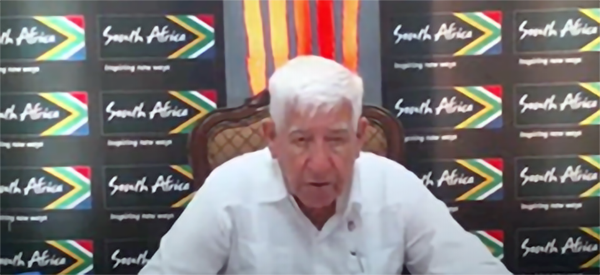
Colonel Venacio Avila Guerero
The struggle continues
General Titus Matlakeng, the retired General of the South African National Defence Force, shared the South African perspective of the war, explaining that it marked a turning point in the apartheid South Africa’s war against Angola. He said: "It ultimately provided an impetus to the processes that led to the negotiation to exterminate the apartheid regime, including the Convention for a Democratic South Africa process and a change to the strategic landscape in Southern Africa."

From left: Adv Sipho Mantula, Researcher: TM-School; His Excellency Ambassador Nelson de Sousa, the Acting Head of Diplomatic Mission at the Embassy of Angola; General Titus Matlakeng, the retired General of the South African National Defence Force; and His Excellency Frank Silva Hernández, Political Counsellor of the Cuban Embassy to South Africa
His Excellency Ambassador Nelson de Sousa, the Acting Head of Diplomatic Mission at the Embassy of Angola, said that the Republic of Angola will never forget the heroes that fought for Angola’s independence in 1975. "After our independence, Angolan people continued to fight for peace and freedom not only for themselves, but for other African nations as well; therefore, Namibian and South African struggles continue."
Concluding the session, His Excellency Frank Silva Hernández, Political Counsellor of the Cuban Embassy to South Africa, gave the vote of thanks towards the university’s community for recognising and commemorating this historical moment. He said: "The fallen soldiers did not die in vain, and the purpose of the mission has been fulfilled, which is to liberate the people of Southern Africa from the apartheid regime."
*By Godfrey Madibane, Acting Journalist, Department of Institutional Advancement
**Photography by Mduduzi Khathamzi, Multimedia Centre
Publish date: 2025-07-14 00:00:00.0
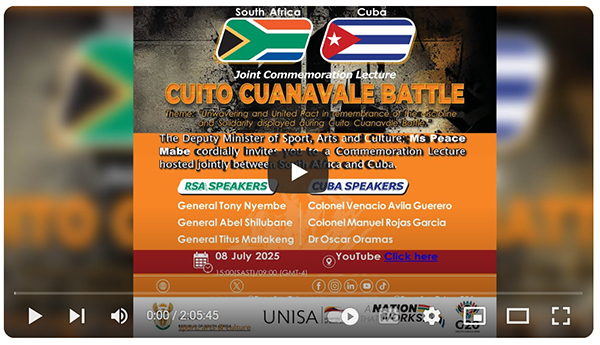


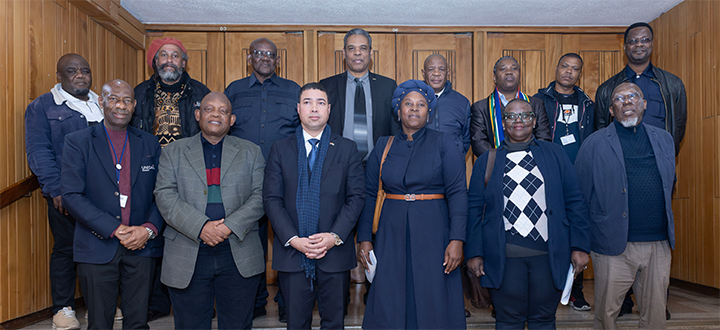 Unisa hosts commemoration lecture on the Cuito Cuanavale Battle
Unisa hosts commemoration lecture on the Cuito Cuanavale Battle
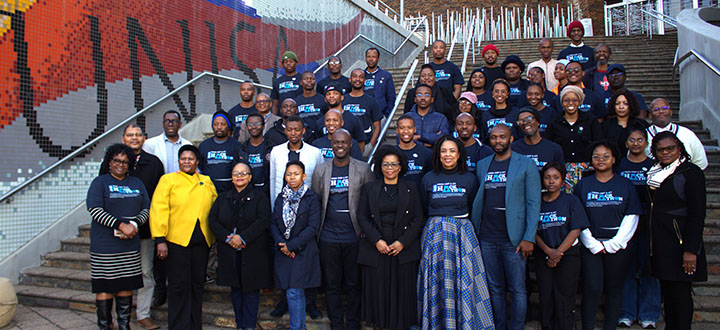 Unisa hosts first-ever Hackathon to ignite student learning experience
Unisa hosts first-ever Hackathon to ignite student learning experience
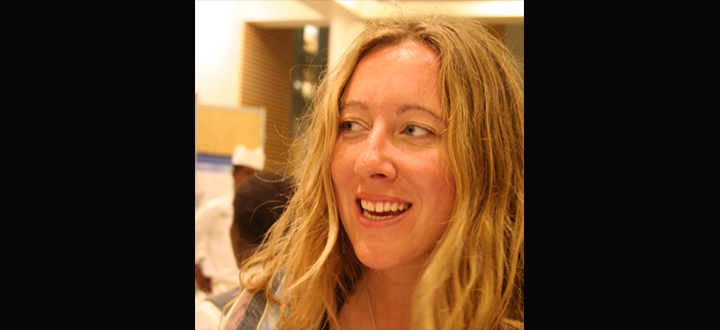 Globally renowned marine scientist to participate at Unisa's Catalytic Niche Area Research Symposium
Globally renowned marine scientist to participate at Unisa's Catalytic Niche Area Research Symposium
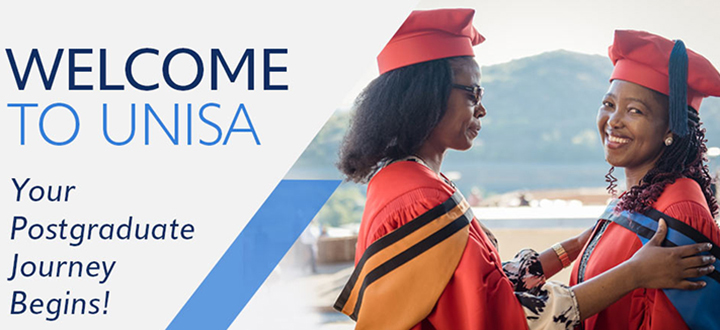 College of Graduate Studies launches video series to support postgraduate student success
College of Graduate Studies launches video series to support postgraduate student success
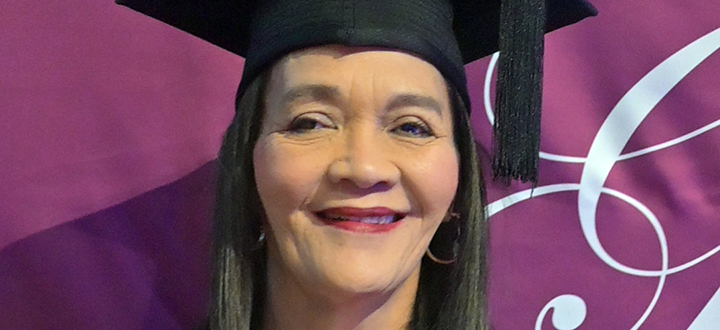 Unisa Western Cape celebrates four extraordinary graduates
Unisa Western Cape celebrates four extraordinary graduates